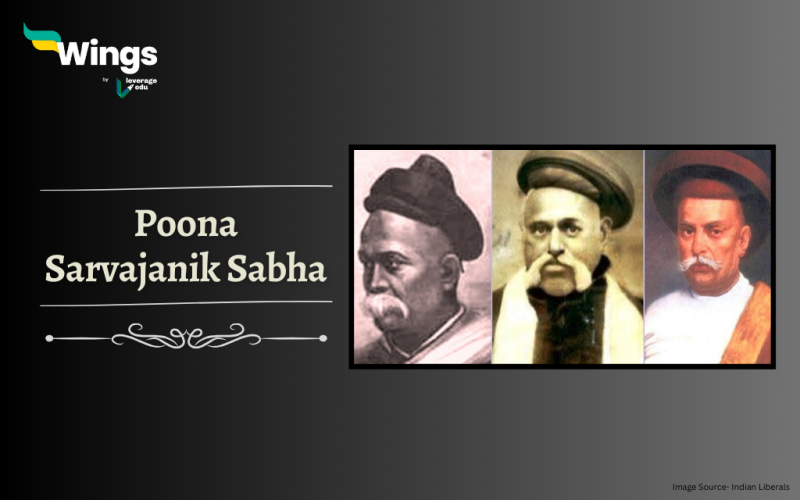The Poona Sarvajanik Sabha, also known as the Poona Public Society, was one of the strongest organizations that was formed during India’s freedom struggle. Founded in 1870, it played a crucial role in advocating for social reform, political equality, and the upliftment of marginalized sections of society. The organization acted as the mediator between the government and Indian citizens. The sabha also was a lead in spreading the Swadeshi Movement in the district. Let us know more about this organization, its founders and aims and objectives with the impact during the independence period.
Table of Contents
The History of Poona Sarvajanik Sabha
The Poona Sarvajanik Sabha was established in the city of Poona (now known as Pune) in the western Indian state of Maharashtra. It was established on 2nd April 1870.
- It was founded by Mahadev Govind Ranade, Raghunath Narasinha Mudholkar, and social reformer Bhaskar Bhau Ketkar.
- The Sabha aimed to create a platform to address the concerns of the downtrodden and challenge existing social norms prevalent at the time.
- Initially, the organization focused on the issues of education, particularly the establishment of schools and colleges to provide education to all sections of society, irrespective of caste, creed, or gender.
Also Read – Swaraj Party: Formation, History, Accomplishments
The Founders of Poona Sarvajanik Sabha
The sabha was launched by many great leaders like S H Sathe, S H Chiplonkar and GV Joshi, but the sabha reached a new height when M G Ranade joined in 1871.
- Mahadev Govind Ranade: A social reformer, scholar, and jurist, Ranade was one of the key architects behind the formation of Poona Sarvajanik Sabha. He emphasized the importance of education and women’s rights.
- Raghunath Narasinha Mudholkar: An advocate and social reformer, Mudholkar was instrumental in shaping the principles and objectives of the Sabha. He actively worked towards removing social evils like untouchability.
- Bhaskar Bhau Ketkar: A journalist and social reformer, Ketkar was passionate about fighting for the rights of the marginalized sections of society. He played a pivotal role in spreading awareness about social issues through his writings.
- Gopal Krishna Gokhale: A prominent freedom fighter and social reformer, Gokhale worked tirelessly to promote education, women’s rights, and the eradication of caste discrimination.
Other members were Bal Gangadhar Tilak, Ganesh Vasudeo Joshi, etc.
The Aim and Objectives of Poona Sarvajanik Sabha
The main aims and objectives of the sabha were to represent the issues of Social Reform by awakening political discourse and advocating for civil rights. The aims and objectives were –
- Promote social reform and eradicate social evils such as untouchability, child marriage, and the dowry system.
- To advocate for equal rights and opportunities for all, irrespective of caste, creed, or gender.
- Empower the marginalized sections of society and encourage their participation in social and political spheres.
- To provide quality education to all, with a focus on women’s education.
- Create a platform for open deliberations on social issues and encourage the exchange of ideas and opinions.
Also Read – Lala Lajpat Rai – The Lion of Punjab
Impact of Poona Sarvajanik Sabha
In the year, 1876, the sabha was responsible for organizing famine relief in the Indian-Deccan Region. Some other important impacts of the sabha are-
- Social Reformation: The Sabha actively worked towards the abolition of social evils such as untouchability and child marriage. It played a crucial role in creating awareness about these issues and bringing about a change in societal attitudes.
- Education: Poona Sarvajanik Sabha established several schools and colleges, promoting the concept of education for all. It emphasized the importance of women’s education, ensuring equal opportunities for women in acquiring knowledge and empowering themselves.
Also Read – 20+ Greatest Indian Freedom Fighters and their Sacrifices
- Empowerment of Marginalized Sections: The Sabha championed the cause of the marginalized sections of society, fighting for their rights and inclusion in various aspects of life. It provided a platform called “Nyay Sabhas” for these communities to voice their concerns and actively participate in social and political activities.
- The platform for Intellectual Discourse: Poona Sarvajanik Sabha served as a breeding ground for intellectual discourse and the exchange of ideas. It organized public meetings, discussions, and seminars, inviting scholars, thinkers, and social reformers to address various social issues and propose solutions which even led to the successful dissemination of the news of the Swadeshi Movement.
However, after the year 1895, there seemed to be ideological differences between the members resulting in the decline of activities under the Sabha and many leaders joined the newly formed INC as well.
Relevant Blogs
| Pandit Motilal Nehru | Ishwar Chandra Vidyasagar |
| Indira Gandhi | Dayanand Saraswati |
| The Government of India Act 1919 | Kiran Bedi |
| Widow Remarriage Act | Surat Split |
| Bengal Partition | Birsa Munda |
We hope you liked our blog on Poona Sarvajanik Sabha. If you want to read more articles like this you can visit our general knowledge page on Indian History!
 One app for all your study abroad needs
One app for all your study abroad needs













